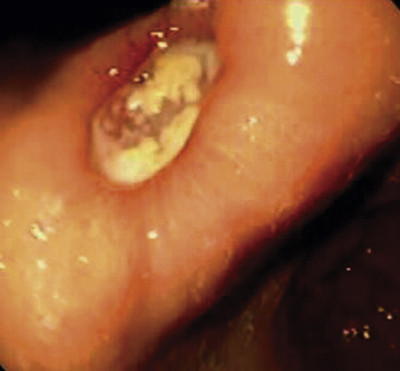peptic ulcer, a sharply circumscribed loss of the mucous membrane of the stomach, duodenum, or any other part of the GI system exposed to gastric juices containing acid and pepsin. Also called gastric ulcer. ▪ OBSERVATIONS: Peptic ulcers may be acute or chronic. Acute lesions are almost always multiple and superficial. They may be totally asymptomatic and usually heal without scarring or other sequelae. Chronic ulcers are true ulcers. They are deep, single, persistent, and symptomatic; the muscular coat of the wall of the organ does not regenerate; a scar forms, marking the site, and the mucosa may heal completely. Peptic ulcers are caused by a combination of poorly understood factors, including an excessive secretion of gastric acid, inadequate protection of the mucous membrane, stress, heredity, and the use of certain drugs, including the corticosteroids, certain antihypertensives, and antiinflammatory medications (especially acetylsalicylic acid and nonsteroidal antiinflammatory drugs). There is growing evidence from research that a bacterium present in the gut—Helicobacter pylori—may be responsible for peptic ulcer disease. Characteristically ulcers cause a gnawing pain in the epigastrium that does not radiate to the back, is not aggravated by a change in position, and has a temporal pattern that mimics the diurnal rhythm of gastric acidity. ▪ INTERVENTIONS: Symptomatic relief is provided with drugs that either neutralize or block secretion of acid and frequent small bland meals. The underlying cause is treated if known. If H. pylori is present, a 2-week triple therapy regimen of tetracycline, metronidazole, and bismuth may be given. Hemorrhage caused by perforation of the muscle and blood vessels may require surgical resection of the damaged area. The diagnosis and evaluation of peptic ulcers involve serial radiographic studies using a contrast medium and endoscopy. A definitive diagnosis is important because the early signs of cancer of the stomach and duodenum resemble those of peptic ulcers. ▪ PATIENT CARE CONSIDERATIONS: The patient is reassured that in most cases the ulcers heal completely and that the pain may be controlled with simple measures. The nurse emphasizes the correct use of antacids and the other medications prescribed. Usually the patient is instructed to eat frequent small meals consisting of foods known to be nonirritating. For many but not all patients, fatty, highly spiced, heavy, or fibrous foods are likely to provoke pain. The use of tobacco and alcohol is discouraged.

